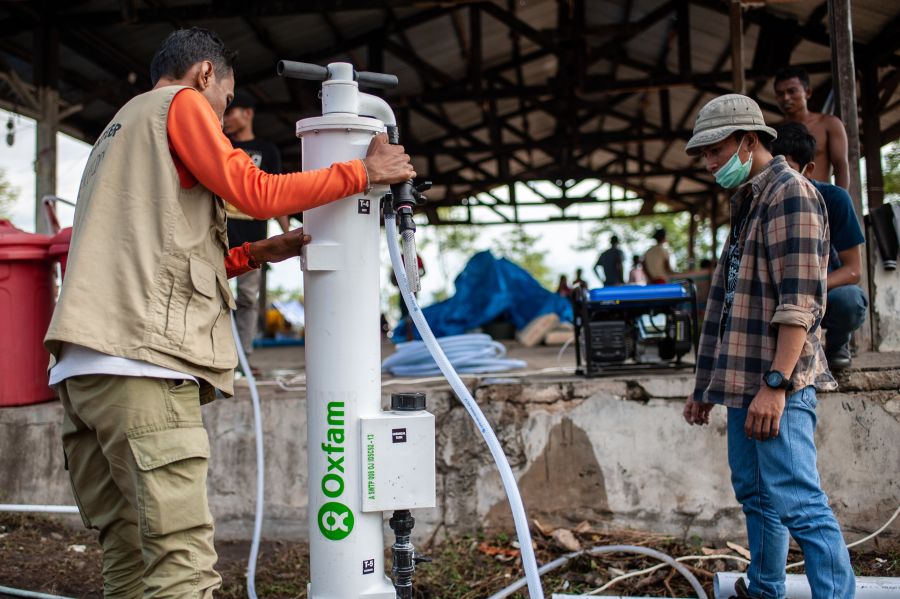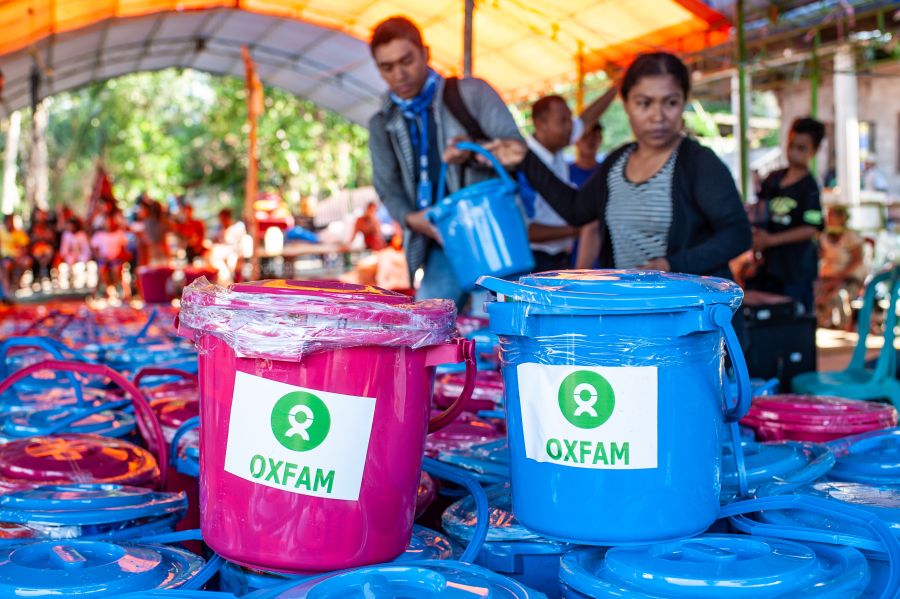
The people of Indonesia have suffered a devastating earthquake and tsunami that washed away their homes and took the lives of their family members, friends and neighbours.
Damage to roads, bridges and the airport, is still hampering response efforts, with limited supplies getting through. However, we're working as quickly as we can, aiming to reach 500,000 people.
What do people need?
- More than 330,000 homes have been seriously damaged or destroyed. People need shelter like plastic sheets and family tents to protect them from the elements.
- Water and sanitation is a major concern because water pipes have been destroyed and there is a severe shortage of clean water and toilets to prevent the spread of disease.
- People also need food, healthcare and medical supplies to treat the injured. Generators are needed for lighting and to aid communications.
 Ronald (32) in front of his father's car repair shop in Palu. Ronald's father was killed when he was swallowed by a sinkhole after the earthquake hit off the coast of Palu, on September 28th. Photo: Andri Tambunan/Oxfam
Ronald (32) in front of his father's car repair shop in Palu. Ronald's father was killed when he was swallowed by a sinkhole after the earthquake hit off the coast of Palu, on September 28th. Photo: Andri Tambunan/Oxfam
What is Oxfam doing?
Oxfam, working in close collaboration with a coalition of local partners, has a team on the ground, delivering hygiene, clean water and shelter materials in Palu and other affected areas.
Here are three examples of the vital aid we’re delivering to those most in need:
Water filters
In every disaster, water and sanitation are the most urgent needs, as well as food. The water supply infrastructure and pipes in Sulawesi have been critically damaged. The city of Palu has become dependent on a fleet of water trucks that are under huge strain to meet demand. Smaller rural communities have no electricity or fuel to pump water from the ground, and some remain cut off by landslides or damaged roads.

The most efficient and fast way to provide clean water is water purification. Oxfam’s water, sanitation and hygiene (WASH) team are bringing in water treatment equipment called the SkyHydrant, that converts ground water into safe drinking water without the need for power or chemicals. It can produce 1,200 litres of clean water per hour from a bore hole – enough for around 500 people per day. (Photo: Hariandi Hafid/Oxfam)
Hygiene kits
There are also major health concerns for the people who are living in internally displaced persons camps across the region. There are very few toilets in the makeshift camps that accommodate some of Palu city’s 70,000 evacuees. Sanitation is a serious concern as water-borne diseases can spread quickly in these circumstances.

Oxfam is currently distributing hygiene kits which will enable people to observe good sanitation and hygiene over the next few weeks or even months they have to live in the camps. The kits consist of a safe container for transporting water, soap and detergent, sanitary pads, nappies, toothbrushes and toothpaste. (Photo: Hariandi Hafid/Oxfam)
Emergency shelters
Mas'ad and her three children are living with their relatives in a makeshift camp for internally displaced people, near her destroyed house in Dampal village, Donggala district, about 700 kilometres south-north of Palu in central Sulawesi. “My three children and I ran away from home when the first quake hit. When the tremor hit for the second time, it broke my house,” she says.

Oxfam and partners have distributed almost 500 tarpaulins and 400 sarongs for survivors in Dampal village. “Thanks for Oxfam which has given us a tarpaulin and a cloth called ‘sarong’. I want to set up the tent in front of my house so it will be easier to cook nearby my home now.” (Photo: Irwan Firdaus/Oxfam)
Help us do more, donate now
You can support our humanitarian response worldwide by donating today. Your donation will help us reach the most affected people with vital aid and save lives.